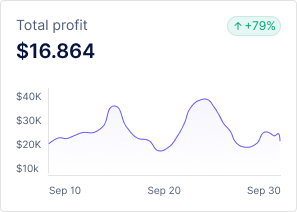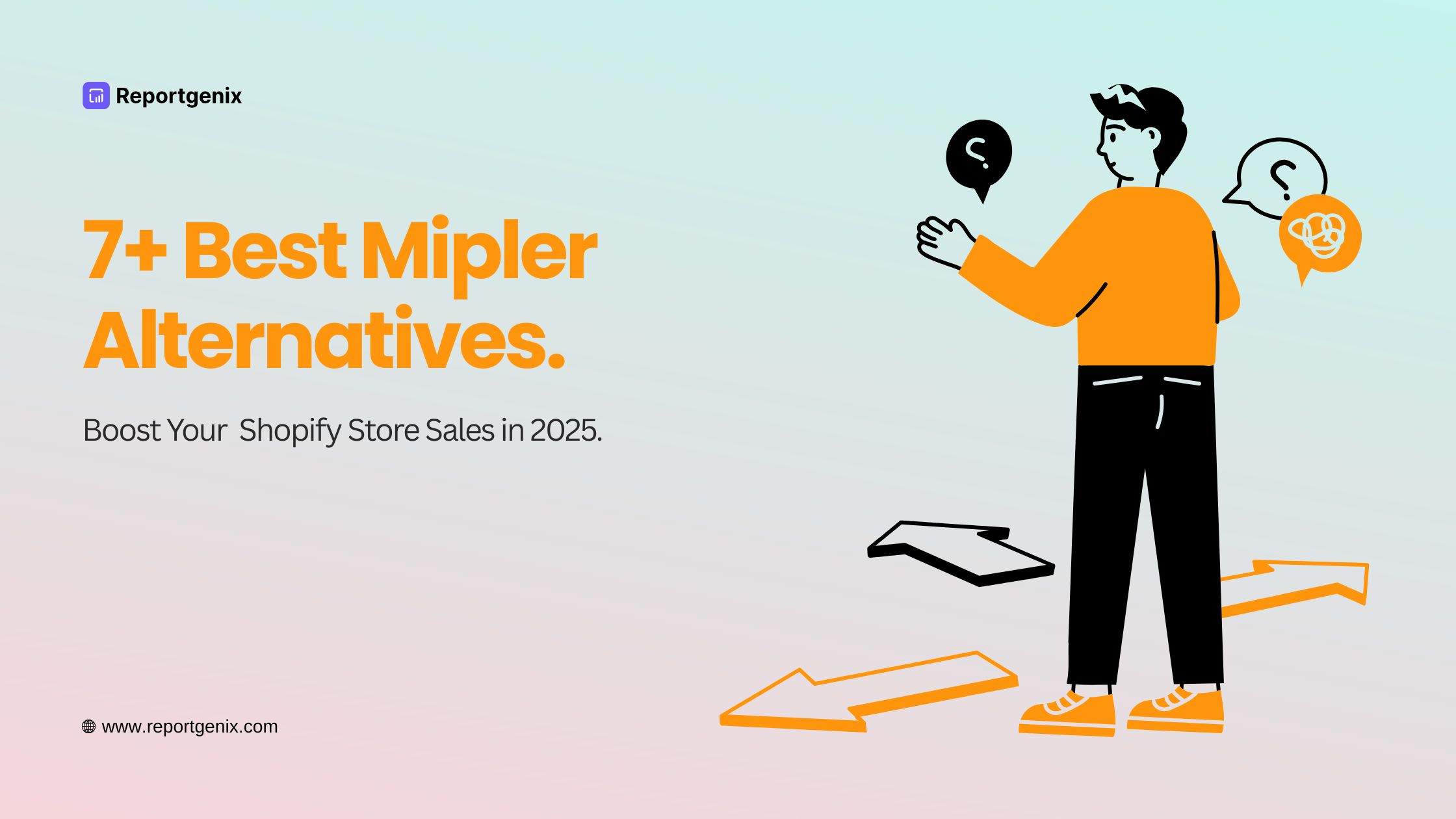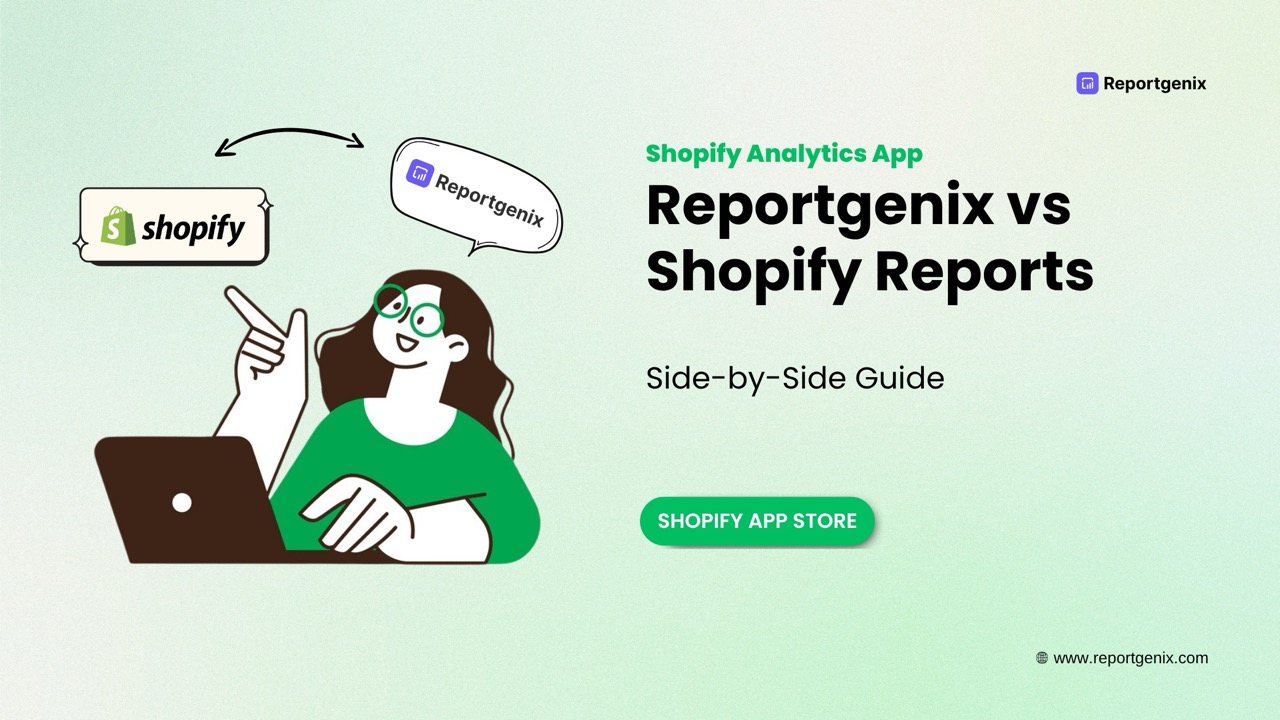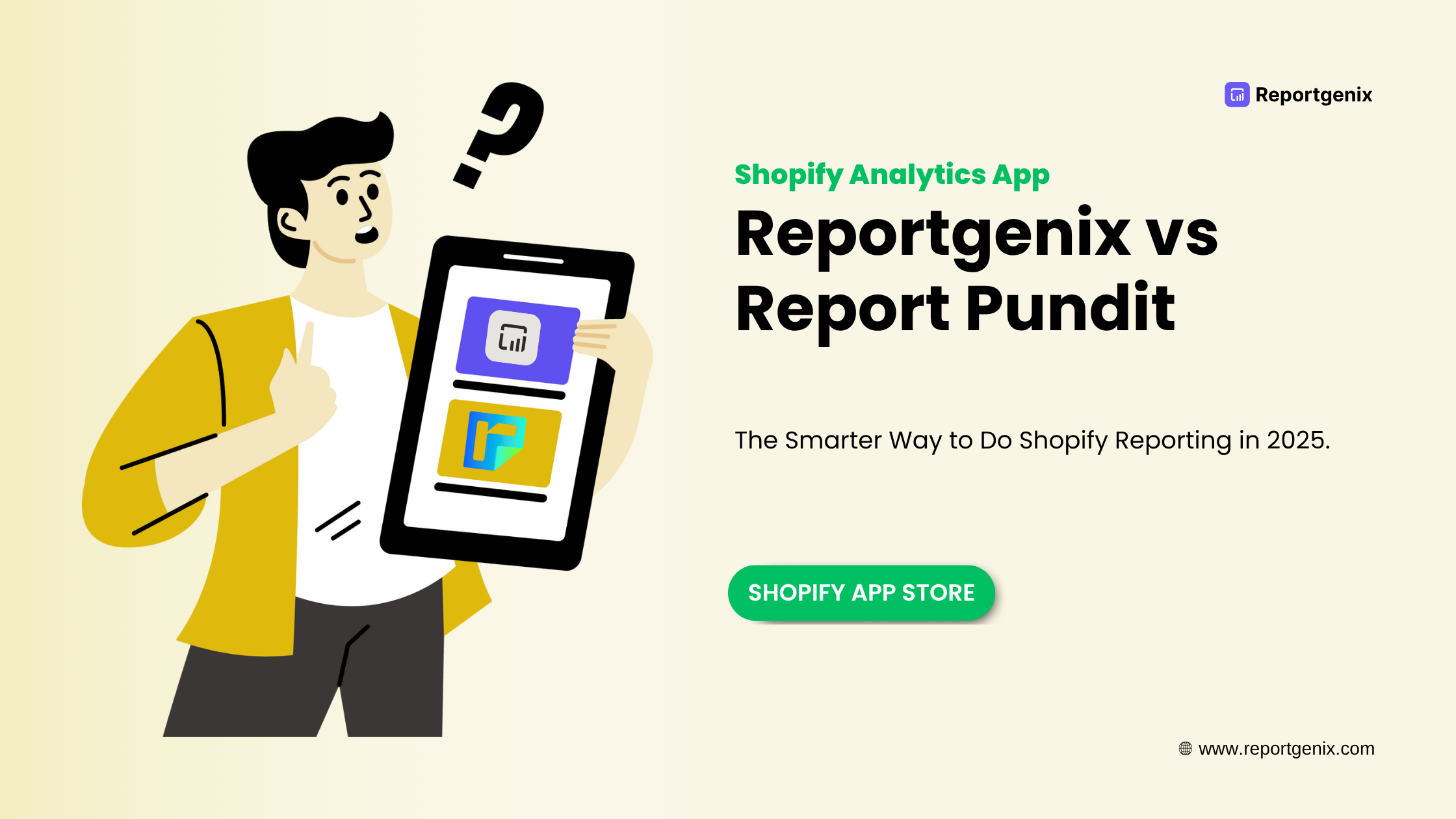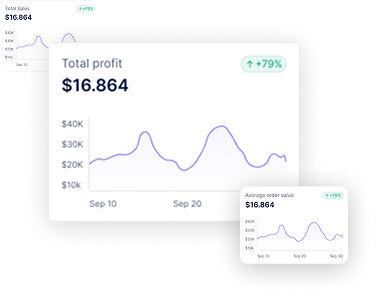Reportgenix vs Report Toaster: Which Shopify Reporting Tool Helps You Grow?
Get Summary On:

You’ve got the products. You’ve got the traffic. You’ve even nailed your customer experience. But your reports? Still a confusing pile of spreadsheets, disconnected metrics, and “What does this even mean?” moments. Shopify gives you just enough data to stay reactive, but not nearly enough to scale smarter. That’s why merchants turn to third-party reporting tools.
Two names you’ll hear often? Reportgenix and Report Toaster.
Both aim to give Shopify store owners better visibility, deeper analytics, and more control over business performance. But while they share similar goals, their approaches are different. One emphasizes clean design, automation, and AI-powered reporting. The other goes deep into Shopify’s API to give users more raw data access and filtering flexibility.
So, which one is better for your store?
This guide’ll compare Reportgenix vs Report Toaster feature by feature. Whether you’re a solo operator or manage multiple storefronts, this comparison will help you choose the right tool for data-driven growth.
At a Glance: Reportgenix vs Report Toaster
Before we get into the details, here’s a quick overview (Reportgenix vs Report Toaster) of how Reportgenix and Report Toaster stack up across key criteria like ease of use, automation, integrations, pricing, and ideal user fit:
| Feature | Reportgenix | Report Toaster |
| Ease of Use | Highly intuitive, beginner-friendly | Simple UI, but the setup can feel technical |
| AI-Powered Insights | Yes – smart suggestions & report automation | No AI – fully manual configuration |
| Custom Reports | Drag-and-drop builder | Customizable via filters, tags, and groupings |
| Templates | 25+ curated, plug-and-play reports | 80+ pre-built reports across categories |
| Real-Time Dashboards | Live metrics with visual graphs & summaries | Real-time data, less visual focus |
| Multi-Store Support | Not yet available | Yes – supports multiple Shopify stores |
| Integrations | Shopify-native | Shopify-native + CSV/JSON/Webhooks |
| Export Options | CSV, PDF | CSV, Google Sheets, JSON |
| Pricing | Starts at $4.99/month (Free for small stores) | Free for up to 3 templates, paid plans from $15 |
| Best For | DTC brands & non-technical users | Data-focused merchants & advanced filtering needs |
Inside Reportgenix: Profit-First Reporting, Made Effortless
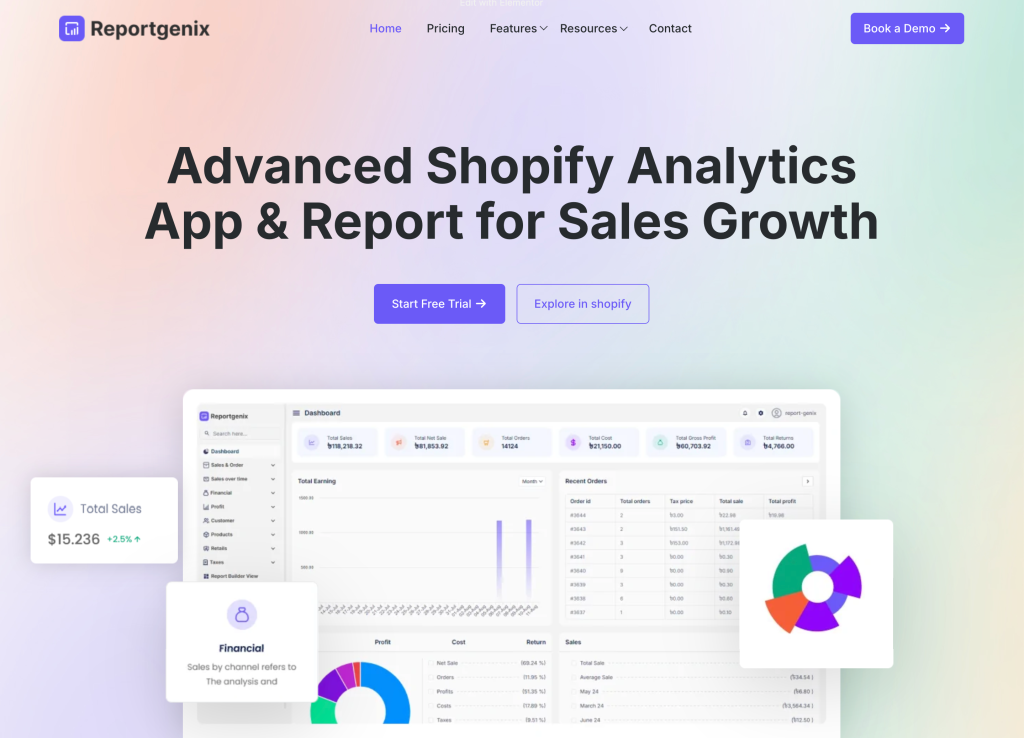
What it is:
An AI-powered Shopify analytics platform built for teams who want answers, not complexity. Designed for growth-stage stores, Reportgenix delivers insights that connect to real revenue decisions.
Standout Features
- Genix AI: Ask questions like “What were my top 10 profitable SKUs last month?” and get visual answers instantly.
- Drag-and-Drop Builder: Build custom reports with zero code.
- Real-Time Dashboards: See live trends across sales, refunds, and customer behavior.
- Pre-Built Templates: 25+ reports designed to answer real business questions.
- Multi-Currency Profit Tracking: Get accurate revenue across regions.
- Automated Reports: Delivered to Slack or your inbox on your schedule.
Ideal for: Shopify-first teams who want intelligent, visual, profit-driven reporting with minimal effort.

Inside Report Toaster: Granular Data, Built for Full Control

What it is:
A data-rich Shopify reporting solution designed by Cloudlab. Report Toaster caters to merchants with complex operations, offering deep filtering and access to 80+ Shopify data fields.
Standout Features
- 80+ Report Types: From inventory ageing to tax to staff performance.
- Advanced Filters: Segment by tag, condition, metric, or custom field.
- Multi-Store Capabilities: Consolidate performance across storefronts.
- Tax & Accounting Ready: Reports for U.S., EU, and other regions.
- Exports & Webhooks: Push data to Sheets, CSV, or JSON; trigger workflows.
- Custom Builder Help: Build complex reports with live support assistance.
Ideal for: Agencies or enterprise sellers with technical teams who need granular, cross-functional reporting.
Reportgenix vs Report Toaster: What Really Sets Them Apart
Now that we’ve seen what each platform offers individually, let’s compare Reportgenix vs Report Toaster feature by feature to understand where they differ—and which is better suited for your workflow and growth stage.
AI-Powered Insights
Reportgenix
One of Reportgenix’s most significant advantages is its AI integration. Instead of manually building every report, the system intelligently identifies revenue-impacting patterns, like sudden dips in a product’s performance or shifts in customer behavior. It even lets you ask natural language questions and generates visual insights instantly. This automation makes it a time-saver for merchants who want to focus on action, not data assembly.
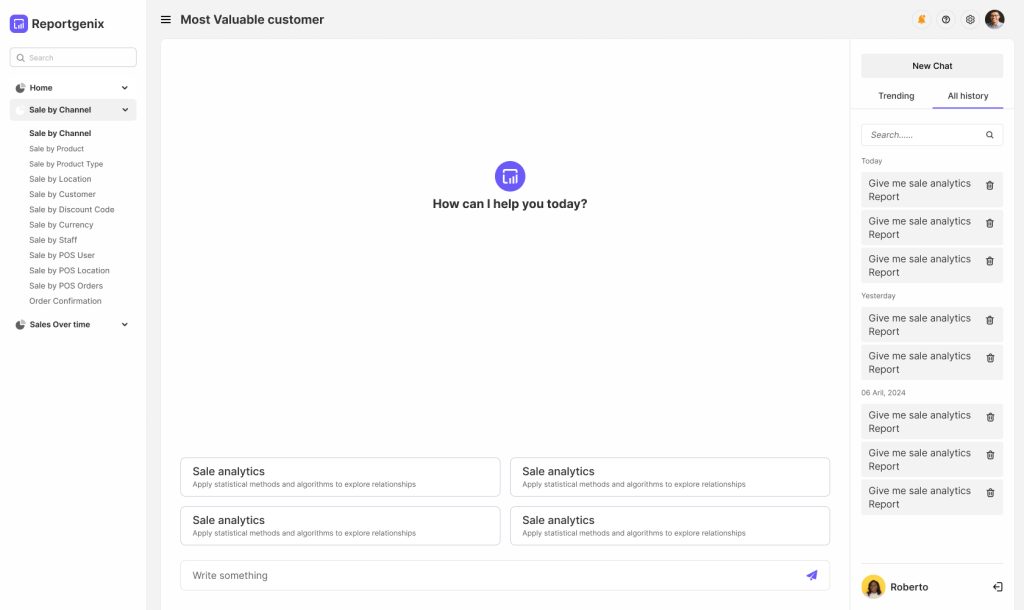
Report Toaster
There’s no AI layer in Report Toaster. All reporting is manually built, either through pre-made templates or advanced filtering. It’s designed for technical users who want complete control rather than AI guidance.
Winner: Reportgenix – Built-in AI insights make it faster to spot what matters.
Templates & Dashboards
Reportgenix
It offers 25+ goal-oriented templates to answer fundamental business questions, such as “Which customers are most likely to churn?” or “Which products yield the best profit margin?” Dashboards are clean, real-time, and designed for fast scanning.
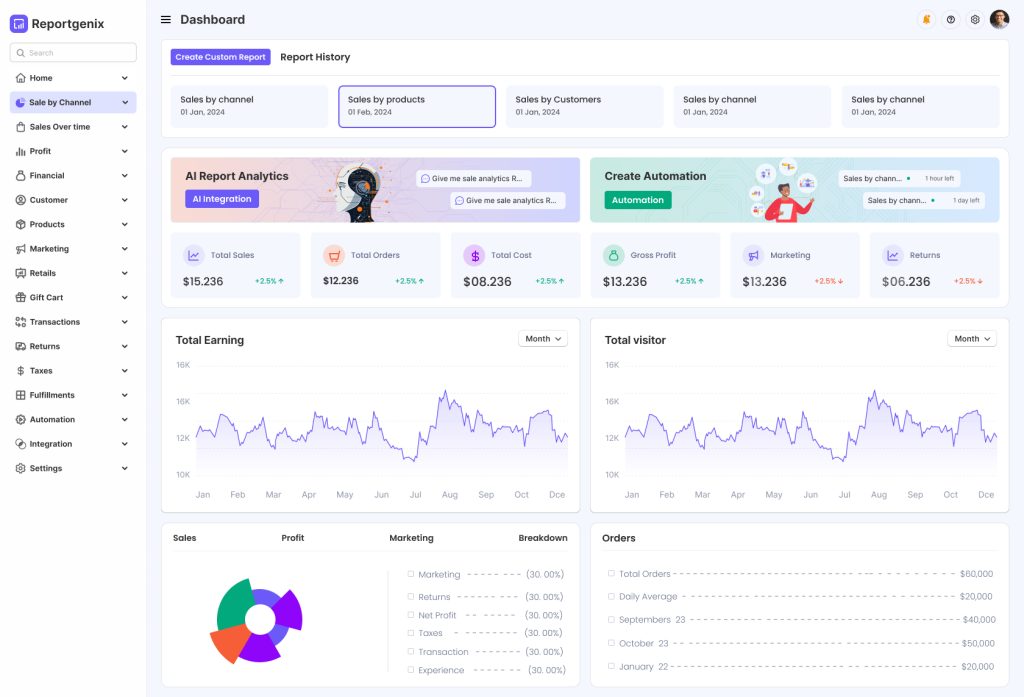
Report Toaster
Includes over 80 templates covering every Shopify dataset imaginable—orders, inventory, finances, and more. However, they are more utilitarian in design and often require user adjustments to match business goals fully.
Winner: It depends on your need. Reportgenix wins for focus and clarity, and Report Toaster wins for variety.
Custom Report Building
Reportgenix
Built for speed and ease. Its drag-and-drop builder lets users customize reports in minutes—select metrics, choose filters, and generate graphs with zero coding. It’s a strong choice for marketing and ops teams who want usable reports quickly.
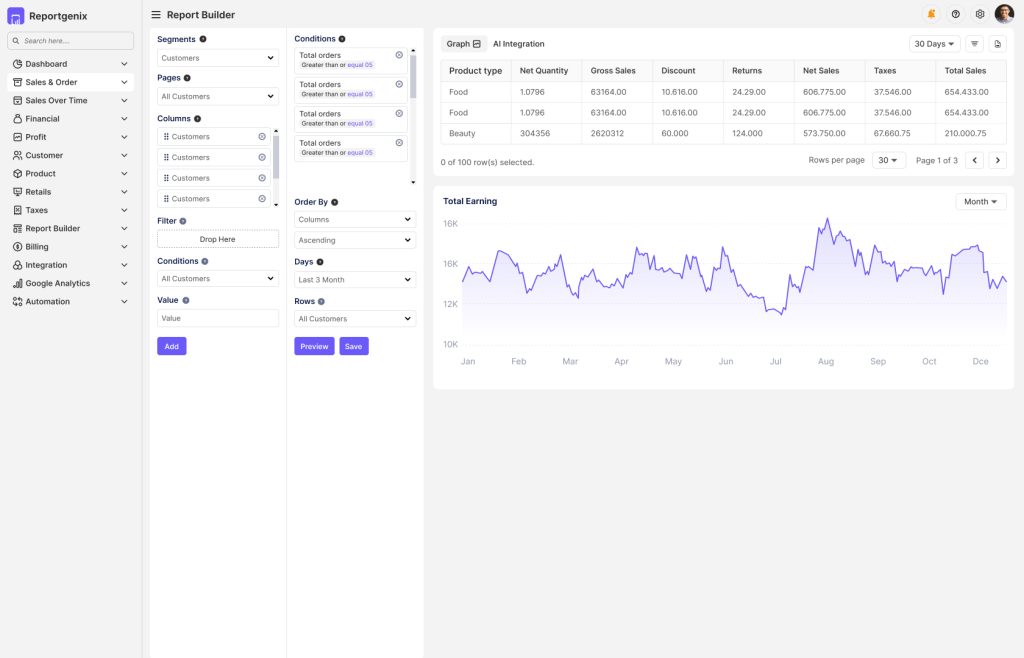
Report Toaster
Highly customizable through field selection, conditions, tagging, and grouping—but it doesn’t have a visual builder. It’s powerful, but configuring reports feels more like setting up a database query than dragging widgets.

Winner: Reportgenix – Easier and faster for most users, while Report Toaster offers more technical depth.
Real-Time Dashboards
Reportgenix
All metrics update in real time, with visual summaries and trend graphs. Whether it’s today’s revenue or this week’s new customers, data is always up to date and instantly digestible.
Report Toaster
Also offers real-time data but lacks visual emphasis. Data loads quickly, but most reports display as plain tables or filtered lists without dynamic charts.
Winner: Reportgenix – More visually intuitive and dashboard-friendly.
Multi-Store Support
Reportgenix
It currently supports only one store per workspace. Multi-store reporting is on the roadmap but not yet available. It is best suited for single-brand operators and small businesses.
Report Toaster
Fully supports reporting across multiple Shopify stores from a single account. You can combine, compare, and filter data across storefronts.
Winner: Report Toaster – Ideal for agencies and multi-brand operations.
Integrations & Export Options
Reportgenix
Allows one-click export to PDF and CSV. Designed for users who want a fast, clean way to share reports with their team or stakeholders.
Report Toaster
It offers robust export options, including CSV, JSON, Google Sheets, and Webhooks. This is great for businesses that want to automate exports or push data into other platforms.
Winner: Report Toaster – More options and deeper integration flexibility.
Support & Onboarding
Reportgenix
It takes minutes to set up. Most users can begin building reports without any training, and support is available via chat. It is ideal for solo operators or teams without data analysts.
Report Toaster
Requires more learning time, but their live support is hands-on and helpful, especially for users building complex custom reports. More effort upfront, more depth over time.
Winner: Reportgenix – Easier to onboard and quicker to deploy.
Pricing Showdown
| Plan | Reportgenix | Report Toaster |
| Free Option | Yes (up to 999 orders/6mo) | Free for 3 templates |
| Paid Plans | From $4.99/month | From $15/month |
| Value for Growth | Strong entry-level + AI included | Scales better with technical ops |
Winner: Reportgenix wins on affordability and simplicity. Toaster scales with complex setups.
Final Verdict: Reportgenix vs Report Toaster- Which One Belongs in Your Tech Stack?
Choose Reportgenix if you want.
- Clear dashboards and instant reports
- Fast setup and built-in AI
- A tool that grows with your Shopify store, not against it

Choose Report Toaster if you need:
- Multi-store rollups and export workflows
- Advanced filtering logic and 500+ data fields
- A more technical, API-style control centre
Conclusion- Reportgenix vs Report Toaster
Choosing between Reportgenix vs Report Toaster isn’t about which tool is “better.” It’s about which one aligns with how you run your store.
If you’re looking for fast, visual insights, clean dashboards, and AI that helps you move from confusion to clarity, Reportgenix is your go-to. It’s built for speed, simplicity, and decisions that move the needle.
If your business thrives on data depth, multi-store operations, and fine-grained reporting logic, Report Toaster puts the control in your hands. Just be ready to invest more time in setup and configuration.
So ask yourself: Do you want a tool that helps you grow smarter or lets you go deeper? Either way, you’ve got the data now pick the platform that makes it work for you.
FAQs
Is Reportgenix better than Report Toaster for quick insights?
Yes. Reportgenix is designed for merchants who need fast, actionable insights without a steep learning curve. Its AI surfaces trend automatically, while Report Toaster requires more manual configuration.
Can I use Reportgenix if I’m not good with data?
Absolutely. Reportgenix is built for non-technical users. With a drag-and-drop interface, guided templates, and real-time dashboards, it helps you get insights without digging through spreadsheets.
Does Report Toaster offer live dashboards?
Report Toaster supports real-time data but focuses more on raw reports than dynamic dashboards. Reportgenix, by contrast, offers visually rich summaries that are ideal for performance monitoring.
Which tool is better for multi-store reporting?
Report Toaster supports multiple Shopify stores within one account, making it ideal for agencies or brands with complex operations. Reportgenix is currently focused on single-store use.
Can I connect Report Toaster to Google Sheets?
Yes. Report Toaster allows scheduled exports to Google Sheets, CSV, JSON, and more. Reportgenix offers simple exports but doesn’t integrate with third-party platforms like Sheets.
What kind of stores benefit most from Reportgenix?
Growing DTC brands, small teams, or solo founders who want simplified reporting, quick setup, and intelligent data guidance—all without hiring a data analyst.

